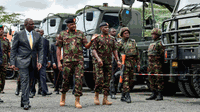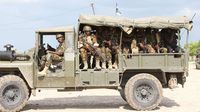Kenya received Sh6.98 billion in reimbursement for its troops fighting Al-Shabaab militia in Somalia in the financial year that ended June, which translates to a 93 percent jump ahead of full withdrawal from the peacekeeping mission in under two years.
The refunds from the African Union Transition Mission in Somalia (ATMIS), formerly the African Union Mission in Somalia (Amisom), grew from Sh3.60 billion in the previous year.
Read: Kenya gets Sh2.5bn for KDF in Somalia
The disbursements in the last fiscal year were the second highest since Kenya joined the AU-backed military operations in the civil war-riddled country, which borders Kenya to the East.
The highest refunds were posted in the year ended June 2021 at Sh8.94 billion.
The Treasury funds operations by the Kenya Defence Forces in the war-torn Somalia and is refunded by the Defence Ministry once it gets cash from the African Union.
The data shows Kenya has been reimbursed Sh58.65 billion in 11 years through June 2023.
Kenya formally sent about 4,660 soldiers to Somalia in October 2011 after incessant attacks and kidnapping of civilians by Al-Shabaab militants within its territory, numbers which have since been gradually trimmed.
A year later, the UN Security Council gave Kenya the green light to join Amisom, a decision that meant the Treasury would not bear the full costs of the incursion.
The ATMIS took over from Amisom on April 1, 2022, following approval from the United Nations Security Council, ending Amisom’s 15-year mission.
The transition and drawdown mission has been mandated to work with Somali National Security Forces towards lasting peace and stability in the Horn of Africa country which has been ravaged by civil war for more than three decades.
The mandate of the ATMIS ends in December 2024 when Kenya, Uganda, Ethiopia, Burundi and Djibouti are expected to have withdrawn all their forces and handed over to the Somali National Security Forces.
Defence Secretary Aden Duale said a fortnight ago that the drawdown, overseen by the UN Security Council and AU guided by the Somalia Transition Plan, started in earnest last June with the five countries withdrawing 2,000 military officers.
Kenya, Uganda and Ethiopia each withdrew 400 of their troops under ATMIS, Burundi drew down 650 officers, while Djibouti withdrew 150 soldiers.
“This September 3,000 troops from all these contributing countries will draw down from Somalia. By December 2024, no more ATMIS will be in Somalia,” Mr Duale said during an interview on Citizen TV on August 16.
“We are in Somalia… to protect the national security interest of the Republic of Kenya and its people … [and] as part of our moral duty to be part and parcel of the regional peace and security in the Horn of Africa.”
Kenya Defence Forces (KDF), in the book titled “War for Peace: Kenya’s Military in the African Mission in Somalia, 2011-2020″— published May 8, 2020 — suggested that reforming the Somali National Army to take charge of sustainable peace should be the first pillar of the AU mission’s exit plan.
The second pillar is creating a “stable, peaceful and prosperous” Jubbaland, which has had relative peace amid years of civil strife in mainland Somalia by “securing routes in Jubbaland accessible to and used by al-Shabaab”.
Soldiers usually serve for one year which may be extended by a few months or cut short depending on the situation and the financial operations.
Also read: European Union cuts KDF pay in Somalia by Sh4.9bn
Earlier estimates suggested the international community pays $1,028 (about Sh149,060 under prevailing rates) for each soldier per month.
Their respective governments then deduct about $200 (Sh29,000) for administrative costs, meaning the soldiers take home about $800 (Sh116,000).
Under the Amisom, the EU funds largely catered for allowances for the about 20,000 Amisom troops and police, international and local civilian staff salaries and operational costs of their offices.
The United Nations Support Office in Somalia (UNSOS), on the other hand, provided logistical field support to the Amisom troops and Somali National Security Forces during joint operations. BY BUSINESS DAILY



